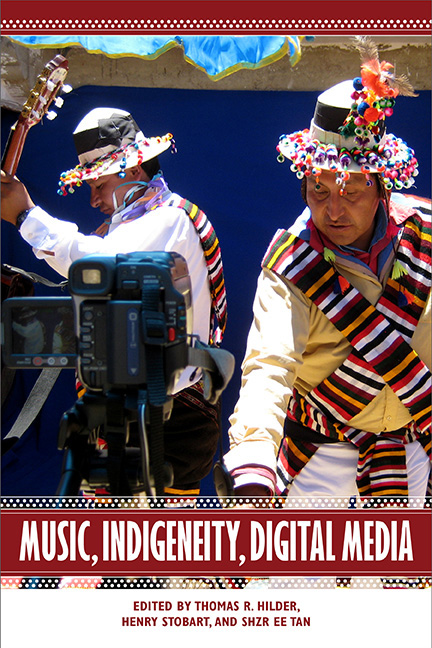Book contents
- Frontmatter
- Dedication
- Contents
- List of Illustrations
- Acknowledgments
- Music, Indigeneity, Digital Media: An Introduction
- 1 Taiwan's Aboriginal Music on the Internet
- 2 Recording Technology, Traditioning, and Urban American Indian Powwow Performance
- 3 YouTubing the “Other”: Lima's Upper Classes and Andean Imaginaries
- 4 An Interview with Russell Wallace
- 5 Mixing It Up: A Comparative Approach to Sámi Audio Production
- 6 Creative Pragmatism: Competency and Aesthetics in Bolivian Indigenous Music Video (VCD) Production
- 7 Keepsakes and Surrogates: Hijacking Music Technology at Wadeye (Northwest Australia)
- 8 The Politics of Virtuality: Sámi Cultural Simulation through Digital Musical Media
- Selected Bibliography
- List of Contributors
- Index
7 - Keepsakes and Surrogates: Hijacking Music Technology at Wadeye (Northwest Australia)
Published online by Cambridge University Press: 26 April 2018
- Frontmatter
- Dedication
- Contents
- List of Illustrations
- Acknowledgments
- Music, Indigeneity, Digital Media: An Introduction
- 1 Taiwan's Aboriginal Music on the Internet
- 2 Recording Technology, Traditioning, and Urban American Indian Powwow Performance
- 3 YouTubing the “Other”: Lima's Upper Classes and Andean Imaginaries
- 4 An Interview with Russell Wallace
- 5 Mixing It Up: A Comparative Approach to Sámi Audio Production
- 6 Creative Pragmatism: Competency and Aesthetics in Bolivian Indigenous Music Video (VCD) Production
- 7 Keepsakes and Surrogates: Hijacking Music Technology at Wadeye (Northwest Australia)
- 8 The Politics of Virtuality: Sámi Cultural Simulation through Digital Musical Media
- Selected Bibliography
- List of Contributors
- Index
Summary
This chapter focuses on some uses of digital recording technology in the township of Wadeye in Australia's Northern Territory, where I worked on a project focusing on djanba, a genre of public ceremonial song created and performed by Murriny Patha people. In this chapter, I will draw a distinction between “traditional” song forms like djanba—ceremonial genres using Indigenous musical forms and instruments whose origins predate contact with Europeans and that continue to be performed due to their fundamental religious and social role—and “nontraditional” musical forms—recently composed secular songs that use introduced musical instruments (guitar, electric piano) and accompanying musical features such as diatonic scales, two-part harmony, and strophic form.
The chapter will discuss emerging nontraditional musical forms composed by members of one of the local Indigenous groups in Wadeye. These new compositions, disseminated via various digital platforms, embody strategic assertions of cultural and territorial autonomy and identity, thereby continuing and developing one of the fundamental functions of traditional song performance. In Australia, as elsewhere in the world, Indigenous identity is not monolithic: “the voluntary perpetuation of cultural distinctiveness,” and the “assertion of territorial (and cultural) autonomy” recognized as common elements of Indigeneity worldwide are cultivated not only in relation to the nation state, but also in relation to regional and local intergroup relations. The deployment of digital media discussed here concerns local distribution, the construction of local collectivities and intergroup politics; a form of “strategic traditionalism,” or perhaps, better, a “strategic blend of traditionalism and innovation” intended as an intervention in local rather than global discourses of identity. As discussed by Hilder in the introduction to this volume, nuanced attention to creative practice in case studies such as this is needed for the development of broader insights into contemporary global articulations of Indigeneity, difference, and identity.
Originally established as Port Keats Roman Catholic mission in 1935, the present-day township of Wadeye lies about 250 kilometers southwest of Darwin. It is home to approximately 2500 people, mainly Aboriginal people descended from about twenty clans from the surrounding areas, whose members were originally attracted to the settlement by the availability of food, work, and schooling.
- Type
- Chapter
- Information
- Music, Indigeneity, Digital Media , pp. 156 - 175Publisher: Boydell & BrewerPrint publication year: 2017



